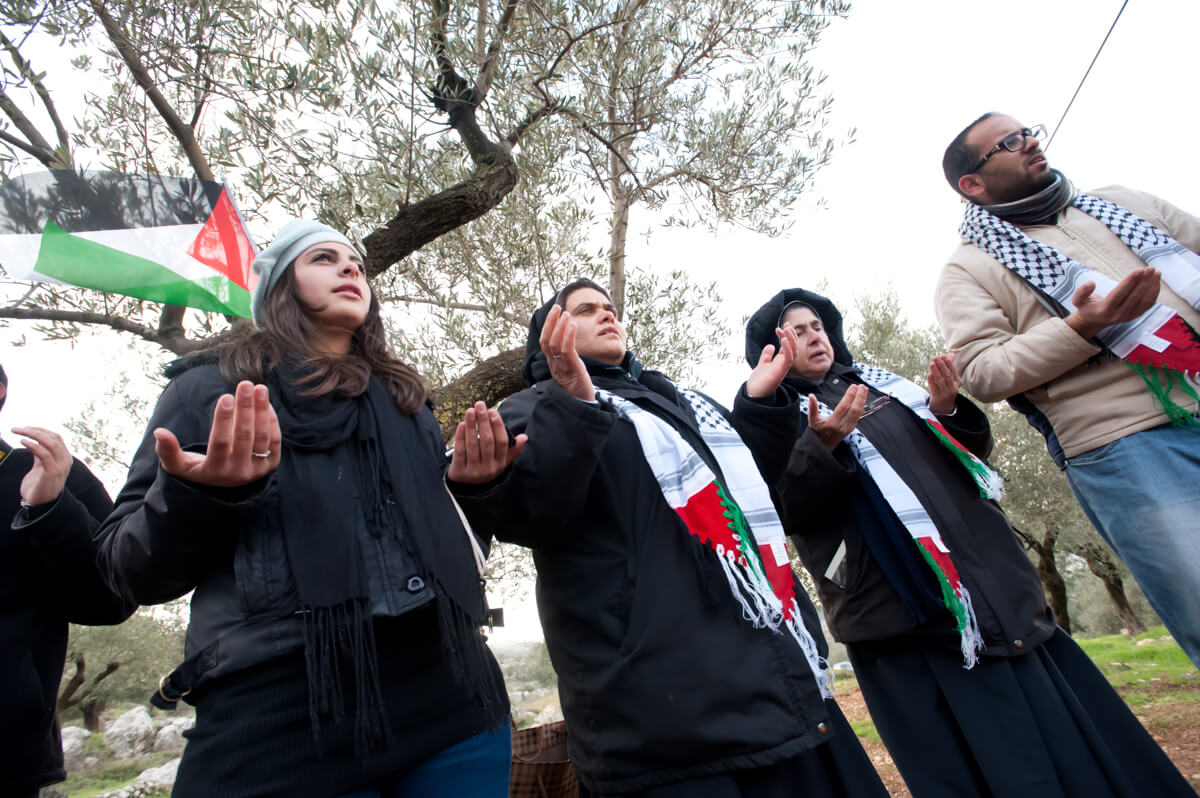In the afterglow of the United Church of Christ’s landslide vote to approve divestment and boycotts targeting occupation-complicit businesses last week, many close observers expected the Mennonite Church USA (MCUSA) to follow suit at their national gathering in Kansas City, Missouri, last week. But rather than add to the momentum of the boycott, divestment, and sanctions (BDS) movement, Mennonite delegates voted to delay any action until the church’s next convention in two years.
The divestment resolution was drafted by the grassroots Mennonite Palestine Israel Network (MennoPIN) but enjoyed broad support among key leaders of the church and its agencies. It called for “withdrawing investments from corporations known to be profiting from the occupation and/or destruction of life and property in Israel-Palestine,” and urged members to “avoid the purchase of products that enable the military occupation to continue, including items produced in Israeli settlements.”
As with other church divestment resolutions, the primary inspiration came from the Kairos Palestine document. Signed by more than 3,000 Palestinian Christians and the leaders of 13 denominations, Kairos Palestine calls for “boycott and disinvestment as tools of nonviolence for justice, peace and security for all.”
But rather than a yes or no vote, delegates chose to table the resolution until the next national convention, ostensibly in order to allow further discussion and educational efforts within the denomination. As the resolution’s supporters commiserated over what went wrong, Palestinian and Israeli allies voiced their disappointment and frustration.
“I am surprised,” said Nora Carmi, project coordinator for Kairos Palestine. “Many were so sure that the resolutions would pass. What happened and why shelve it for two more years? Why miss this Kairos moment?”
“I am disappointed, not so much by their inability to take the step towards BDS, which I agree is not an easy choice for many people to make,” said Ruth Hiller of the Israeli activist group Israeli Disarmament Movement, “but because of the decision to wait another two years before taking a stand at all. The assumption should be that Israel and Palestine do not have two years to wait for them to come to a different decision.”

Carmi and Hiller had both met with various “Come and See” delegations organized by MCUSA and its relief, development, and advocacy agency, Mennonite Central Committee. These trips were also sponsored by Everence, the main financial services agency affiliated with MCUSA and the body primarily responsible for implementing any form of divestment. Because these leaders supported the resolution and had done much to educate a critical mass of pastors at the grassroots, many took its passage for granted.
That “naïve assumption”, as one insider put it, combined with general anxiety about other resolutions related to LGBTQ inclusion, had led denominational leaders to schedule the vote at the beginning of the conference—before a keynote address by Palestinian Christian leader Rev. Alex Awad and a long list of relevant workshops led by church staff who had worked in the region. That strategic scheduling error —over which MennoPIN had no control— spelled disaster for the resolution once it was opened for discussion and faced uninformed questions and negative comments. Some delegates voiced concerns that it was “one-sided” and too “edgy”.
A straw vote showed an even division between “reds, yellows and greens.” It was unclear whether yellow meant proceed with caution or strong caution to proceed.

“Sponsors of the resolution were frustrated with the process. They felt that insufficient time was given to present the resolution and to respond to concerns,” said Andre Gingerich Stoner, MCUSA Director of Holistic Witness. “While many delegates would have preferred to table the resolution for editing and reconsideration at the end of the week, the motion that was made and approved was to table for two years.”
According to activists within the church, one downside of their pacifist tradition is the avoidance of any kind of conflict, sometimes leading Mennonites to tolerate injustice. But once delegates had the chance to hear and reflect on Awad’s testimony as a Palestinian living under occupation, the reality of their missed opportunity began to set in.
“Almost all the friends and delegates who I spoke with were deeply disappointed with the decision to table the divestment vote and postpone the decision for two years,” said Awad. “After I spent three days sharing, I could tell that the mood changed. Many who were confused when they cast their votes came and expressed regret and some even offered apologies.”
As a consolation gesture, delegates unanimously passed a follow-up resolution drafted by MennoPIN declaring “support for our Palestinian and Israeli partners in peacemaking” that commits the next two years as a “time of learning and discernment,” in which “we pledge to pray for peace and act for peace.”
After that final resolution was passed, Awad offered more words of challenge and encouragement. He urged the delegates to study Kairos Palestine and its appeal for nonviolent resistance to the injustice of military occupation. He also challenged delegates to consider BDS. The audience responded to Awad with a spontaneous and extended standing ovation.
Ever the diplomat, Awad offered these gracious words: “I was planning on using this time to scold, but after witnessing what I just saw, I come saying ‘thank you’ on behalf of my people.”
“The decision to table the resolution was not a rejection of the resolution, but rather a mandate to continue educational efforts and dialogue in the church, even as members continue to pray and act for peace in the region,” said Gingerich Stoner. “Sponsors of the resolution saw the unanimous vote on Saturday and the enthusiastic response to Awad as a mandate to continue the efforts they have begun.”
The fact remains that for the church-based BDS movement, instead of a week of back-to-back victories followed by the unsurprising result in the Episcopal Church, it was “one step forward and a step and a half back,” as Haaretz reported once all the votes were counted.
Activist Sahar Vardi, who has served two jail terms for refusal to join the Israeli military, has also met with many Mennonite delegations. She offered this stark reminder that delaying divestment has real-world implications:
I have no doubt that the Mennonite church will divest from Israeli occupation. It’s just a question of time—time in which more and more Palestinians lose their lands and personal freedoms; more Palestinians and Israelis lose their lives. And your church keeps making profit off of this.
Note of Disclosure: Ryan Rodrick Beiler worked with Mennonite Central Committee in Palestine and Israel from 2010-2014.



.
two more years of blood money
.
G-d Bless
.
Two more years…All the Mennonites should be asked not merely to pray, but to read Kate’s regular compilation of daily events in Palestine on Mondoweiss.
“I am disappointed, not so much by their inability to take the step towards BDS, which I agree is not an easy choice for many people to make,” said Ruth Hiller of the Israeli activist group Israeli Disarmament Movement, “but because of the decision to wait another two years before taking a stand at all. The assumption should be that Israel and Palestine do not have two years to wait for them to come to a different decision.”
There is no excuse for this delay. It can’t be because they need more evidence? Is it the fear of being labeled antisemitic? They most likely already are by the more rabid zionists who see non-Jews with nothing but contempt and suspicion. So you have nothing to lose and everything to gain – c’mon now, no more delay!